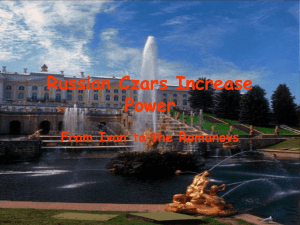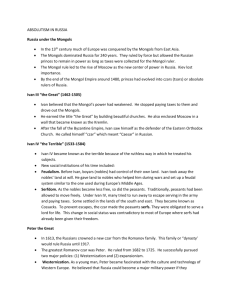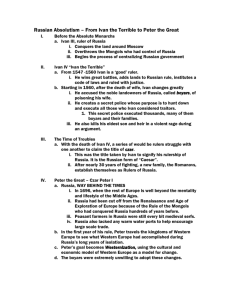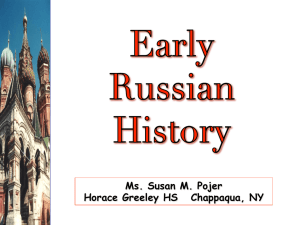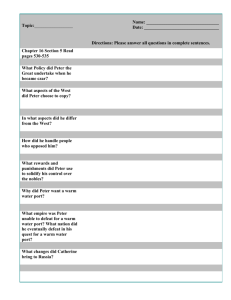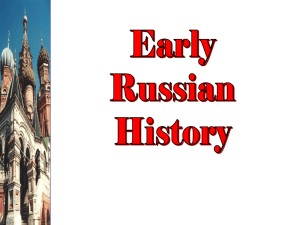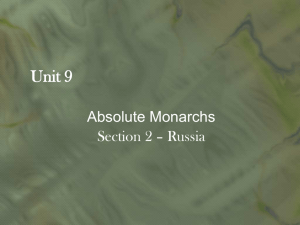Notes – (21 – 4) Absolute Rulers in Russia
advertisement
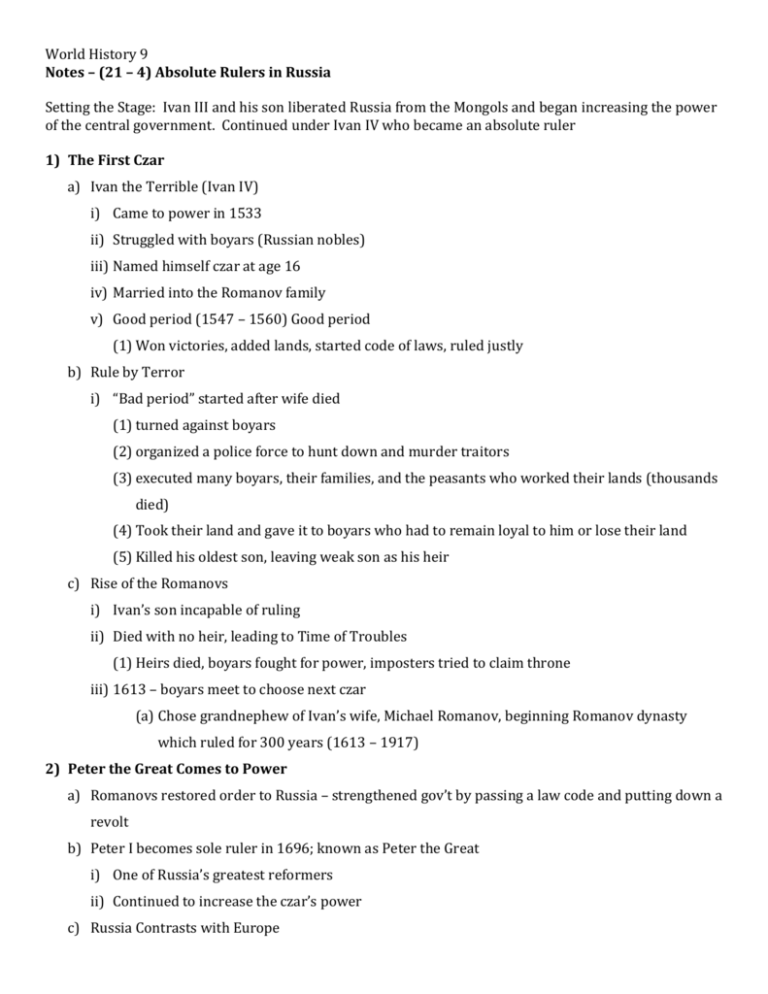
World History 9 Notes – (21 – 4) Absolute Rulers in Russia Setting the Stage: Ivan III and his son liberated Russia from the Mongols and began increasing the power of the central government. Continued under Ivan IV who became an absolute ruler 1) The First Czar a) Ivan the Terrible (Ivan IV) i) Came to power in 1533 ii) Struggled with boyars (Russian nobles) iii) Named himself czar at age 16 iv) Married into the Romanov family v) Good period (1547 – 1560) Good period (1) Won victories, added lands, started code of laws, ruled justly b) Rule by Terror i) “Bad period” started after wife died (1) turned against boyars (2) organized a police force to hunt down and murder traitors (3) executed many boyars, their families, and the peasants who worked their lands (thousands died) (4) Took their land and gave it to boyars who had to remain loyal to him or lose their land (5) Killed his oldest son, leaving weak son as his heir c) Rise of the Romanovs i) Ivan’s son incapable of ruling ii) Died with no heir, leading to Time of Troubles (1) Heirs died, boyars fought for power, imposters tried to claim throne iii) 1613 – boyars meet to choose next czar (a) Chose grandnephew of Ivan’s wife, Michael Romanov, beginning Romanov dynasty which ruled for 300 years (1613 – 1917) 2) Peter the Great Comes to Power a) Romanovs restored order to Russia – strengthened gov’t by passing a law code and putting down a revolt b) Peter I becomes sole ruler in 1696; known as Peter the Great i) One of Russia’s greatest reformers ii) Continued to increase the czar’s power c) Russia Contrasts with Europe i) When Peter I takes power, Russia still land of boyars and serfs (1) Serfdom lasted much longer than in western Europe (2) Serfs treated like property ii) Boyars knew little about western Europe (1) Cut off from the Renaissance and Age of Exploration (2) Geographic barriers (a) Had no warm-water port, so ports choked with ice much of the year (3) Religious differences (a) Russians were Eastern Orthodox; western Europeans Catholics or Protestants who Russians viewed as heretics d) Peter Visits the West i) Peter traveled in German section of Moscow (1) Fascinated by modern tools and machines (2) Knew Russia need a warm water-port to compete with western Europe ii) 1697 – Peter went on the “Grand Embassy,” a long visit to western Europe to learn about European customs and manufacturing techniques 3) Peter Rules Absolutely a) Peter’s goal is for Russia to compete with Europe on both military and commercial terms i) Goal was westernization, using western Europe as a model for change. (1) Was a way to make Russia stronger b) Peter’s Reform i) Peter knew Russia needed change, but that people would resist (1) Increased his power as absolute ruler to force change ii) Brought the Russian Orthodox Church under state (his) control (1) Set up Holy Synod to run it under his direction iii) Reduced power of great landowners by giving positions of authority and grants of land to lower-ranking men iv) Modernized the army by hiring European soldiers to train Russian soldiers with European tactics and weapons (1) Built a huge army (2) Raised heavy taxes to pay for army c) Westernizing Russia i) Introduced potatoes which became staple ii) Started 1st newspaper iii) Raised women’s status by letting them attend social gatherings iv) Make nobles dress in western fashions v) Opened schools of navigation and arts and sciences (1) Believed education was the key to Russia’s progress (2) People encouraged to travel to other countries to study d) Establishing St. Petersburg i) Fought Sweden for a seaport on the Baltic Sea to travel to the West more easily (the Window on Europe) ii) Built St. Petersburg (1) Forced serfs to build city (a) 25,000 – 100,000 died from terrible working conditions (2) For nobles to leave Moscow to live in St. Petersburg iii) By the time he died in 1725, Russia was a great power in Europe (1) Had succeeded in westernizing culture and government Read from the bottom of page 638 (“Catherine the Great”) to 639 to complete this last part. 4) Enlightenment and Monarchy a) Catherine the Great i) Ruled Russia from 1762 – 1796 ii) Ruled with absolute authority, but also tried to reform Russia iii) Formed commission to review and recommend laws (1) Recommended allowing religious tolerance and abolishing torture and capital punishment, but were not accomplished iv) Did little to improve life of serfs; put down serf rebellions (1) gave nobles complete power over serfs, which kept nobles loyal b) Catherine Expands Russia i) Sought access to Black Sea (1) Defeated Ottomans to control northern shore of the Black Sea (warm water) and rights to straits leading to the Mediterranean Sea (2) 1772 – Russia, Prussia, and Austria divided up the weak Poland; Poland disappeared as a country ii) By end of her reign, Catherine had vastly enlarged the Russian empire, becoming an international power
